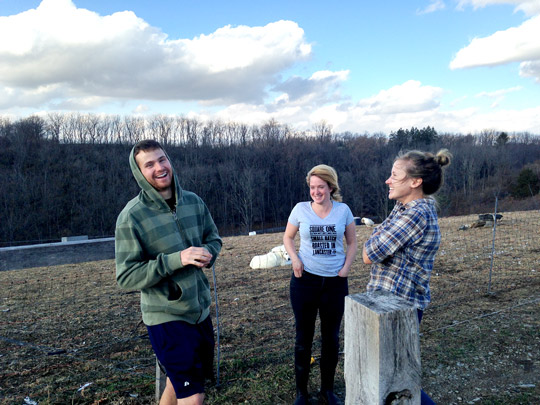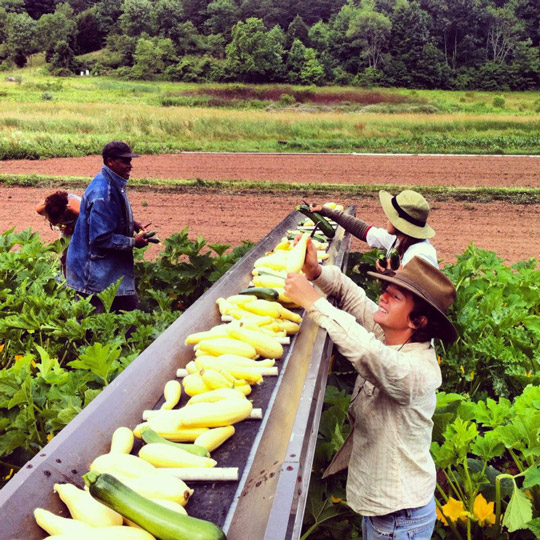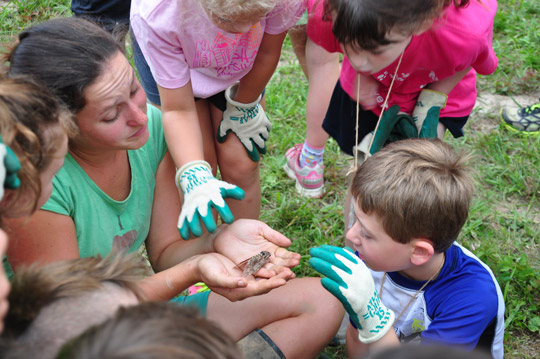Story by Brion J. Shreffler | Illustration by Melissa McFeeters
Interns and apprentices learn the ins and outs of farming while testing their romantic notions about life on a farm
Most job interviews are nerve-wracking, anxiety-causing ordeals. But at the very least, they don’t take very long.
But that’s not the case if you are applying for an internship at Ledamete Grass Farm in Lehigh Valley. Farmer and co-owner Rob Fix adjusted his hiring process to include a two-day working interview after he and his first intern mutually decided to part ways in August 2013—several months short of the season’s end, after Thanksgiving.
“It’s a big decision to come here [to work and live] for eight months,” Fix says of his paid internship, which includes room and board. “So, we want to make sure they’re comfortable with who and how I am, and we’re comfortable with who they are.”
In addition to knowing that the would-be intern can handle the daily grind of working on the farm—the most recent interviewee took part in turkey slaughtering this past November—Fix wants to see whether they have the problem-solving mentality the job requires. To test them, he uses a few simple tricks, such as allowing a hose to freeze before saying that his pasture-raised cows, chickens, pigs and turkeys need water.
For Fix, who owns the farm with his wife, April, it’s essential to find someone who persistently searches for better ways to do everyday tasks and can eventually be left on his or her own.
“They might come here with a romantic ideal of what farming is and will realize that sometimes it’s some really hard work and really tough on the psyche,” Fix says. “It’s a tough life, but it’s a beautiful life.”
Hunter Smith, 24, who finished a May to November 2014 internship at Ledamete (pronounced Let-em-eat), gained Fix’s full confidence in his abilities around mid-July, allowing Smith to run the farm while Fix took pigs to slaughter.
At the farm, Smith’s typical weekday began at 6 a.m. to feed and water the chickens and pigs before moving the cows to another paddock of grass. From 9:30 a.m. to 12:30 p.m., he says it was a different project everyday that often involved cleaning the nursery or building temporary fencing for the cows. The afternoon’s tasks could include digging holes and installing posts for fencing in the woods to keep the pigs in. Final chores were completed from 7:30 to 8:30 p.m.
For Smith, the long hours and demanding nature of the job were worth it: “I appreciate living sustainably and I like the work.”
Hunter Smith takes a break during his internship at Ledamete Grass Farm. | Courtesy Ledamete
Fix and April both interned on farms in the early 2000s. The two met in February 2006 at a conference run by the Pennsylvania Association for Sustainable Agriculture (PASA), a nonprofit organization that promotes information sharing and education for farmers, while helping sustainable, eco-friendly farms and their associated community minded food systems to be economically viable.
After marrying in 2008 and buying the farm in 2009, April and Rob started marketing products from Ledamete in the spring of 2010. “I figured, I enjoy the work—now let’s make it a lifestyle and a business,” Fix says. “I wanted to get involved with local food systems to do my part.”
Driven by Ideals
In addition to progressive farms like Ledamete that have come into existence in the last five to 10 years, there are the farms that share the same values and have been farming sustainably for decades.
New Morning Farm in South Central Pennsylvania is such a farm. Since its inception in 1972, the farm has relied on paid apprentices. Owner Jim Crawford had considered law school in his 20s before surrendering to his passion for growing food, which had begun as a child when his parents entrusted him with a small garden plot. “We didn’t grow up on farms,” he says of himself and his wife, Moie. “We learned this from scratch. We have a natural affinity and rapport with [apprentices] because we were there once ourselves.”
Crawford says that just as he knew he wanted something different than the life a college degree prepared him for, today’s generation of twenty-somethings are looking beyond the typical cubicle and 9 to 5 routine. Crawford feels that he, and farmers like him, could be tapping into the “disillusionment with some of the conventional things that college graduates have to do these days.”
At Crawford’s organic vegetable farm, apprentices are assigned anywhere from two to six crops to manage, as well as two general farm jobs, such as managing irrigation, pest control, greenhouse management, and maintenance and repairs for equipment, vehicles and buildings. Apprentices also help run the farm’s four market stands in Washington, D.C.
Apprentices are expected to start between March and May, with Thanksgiving and Christmas as paid holidays. Many choose to work at least some time over the winter.
Pearl Wetherall harvests squash at New Morning Farm. | Courtesy Pearl Wetherall
“Full time means that we expect people to be available to work at the farm if we need them, but there is some flexibility outside of our main season months,” says senior crew member Pearl Wetherall, 30. If apprentices sign on for the next season, they’re given a month’s paid vacation to be taken anytime between December and March.
During the busiest months, June to September, they work Monday through Friday and every other Saturday, typically from 7 a.m. to 6 p.m.
As for finding apprentices, Crawford says, “[Early on, we] used to do a lot of recruiting on college campuses.” Citing an increase in interest that has coincided with the growth of the food movement, he says he hasn’t needed to do much advertising in the last 10 years.
Next Steps
Since 2012, Emily Best, 31, has apprenticed at New Morning Farm. “[After graduating,] I was thinking I would work at a think tank or a nonprofit and work on food policy,” Best says. “[But] after that season [at New Morning] was over, I really liked it, so I stuck with it.”
By the end of her first season, she felt that it was serendipitous that she couldn’t find work that drew upon her graduate studies in environmental policy. “I thought, ‘I feel good about my work,’ ” she says. “It’s very honest work and I felt like I’m a part of something. I didn’t want to leave that for a job that was not going to feel the same way.”
Emily Best works at New Morning Farm’s farmers market stand. | Courtesy Emily Best
While Best loves her work on the farm, she has an interest in finding something that will allow her to have a greater impact and draw upon her educational background. Until then, she is enthusiastic about staying on for one or two more seasons, adding she’d only leave if it’s the right fit. Whatever she does, she wants to be an advocate for young farmers while “contributing to the conversation surrounding agriculture, food and health.”
Wetherall took classes while studying at Green Mountain College in Vermont that spoke to what she calls her “tripod of sustainability”—covering ecological, social and economic issues. Her agriculture classes exposed her to getting her hands dirty and she was hooked. After graduating in 2007, she did an apprenticeship on a farm in Vermont prior to a term with AmeriCorps in Wayne County, Pennsylvania.
A desire to learn more about food production and a love for “growing plants and being outside” brought her to New Morning Farm in 2009, where, after several seasons, Wetherall worked her way up to senior crew member.
Wetherall could soon be added to the long list of farm owners—Crawford estimates the number to be roughly 40 or so—to emerge from the apprentice program. And when Crawford steps down, which he says may happen “soon,” she and fellow senior crew member Jen Glenister are considering taking over New Morning Farm. Wetherall says they’re thinking of transitioning the farm from a family-run business to a co-operative model, though she adds that many of the details are still up in the air.
In February of 2015, Smith, who interned at Ledamete, is starting as an assistant farm manager at Pathfinder Farms in Catskill, New York. He says his new boss, Jim Bulich, put out the idea of helping him finance his own farm, which he plans to start in three years.
While Smith loved the exposure to rotational grazing that he got at Ledamete, particularly with Fix’s large numbers of chickens, he says he’s looking forward to working with a much larger number of cows at Pathfinder Farms. He’ll take Fix’s ever-proactive approach with him: “Something Rob always hammers home is that there’s a way and there’s always a better way to do things.”
Fix says that Smith will be missed, especially by his four-year-old who teared up on Smith’s last day at Ledamete. “He’s a blessed part of the community on the farm here,” Fix says. “I think that’s something that farming cultivates in itself—a rooting of oneself to the land that you’re on or the community that you’re involved in.”
Educating Through Agriculture
Educating future farmers is a specific goal of the Pennypack Farm and Education Center, which created its first farm site in Horsham, Pennsylvania, in 2003, shortly after becoming a nonprofit. A second farm site opened in Fort Washington, Pennsylvania, in 2013. The paid internship program at both sites runs five days a week and interns who enjoy their three-month summertime stint can make the leap to Pennypack’s more intensive two-year paid apprentice program, which requires six days of work a week at one of the two organic vegetable farm sites. On-the-job and classroom training is combined to progress apprentices to managers in their second year, aiming to teach them to learn how to manage a farm.
“Our programs, particularly our internship, gives college-age people the opportunity to see if they want to pursue agriculture as a more viable career option,” says Diane Diffenderfer, the Education Director at Pennypack. Apprentices at Pennypack complete an online course in conjunction with the New Entry Sustainable Farming Project (New Entry) and Tuft’s University.
Lauren Sadler initially thought she would only be rounding out her horticulture degree from Temple University when she started an apprenticeship in March 2013, but fell in love with the work.
Lauren Sadler teaches visiting children about a sphynx moth at one of Pennypack’s farms. | Courtesy Pennypack.
In November, she started as an assistant farm manager at the for-profit Everblossom Farm in East Berlin, Pennsylvania after completing her two-year apprenticeship at Pennypack in October 2014. She plans to work there for three years and learn from owner Elaine Lemmonhow to run a for-profit farm while balancing the demands of being a farmer and a mother. A love for delicious, sustainably raised food drives Sadler, who says she’d like to follow in the footsteps of former Pennypack intern and assistant manager Jen Topper, who launched Topp Notch Farm, an organic vegetable and flower farm, in January 2014.
“Right now I’m paying my dues,” Sadler says in regard to taking the next step in realizing her dream. “But this makes me so happy.”










